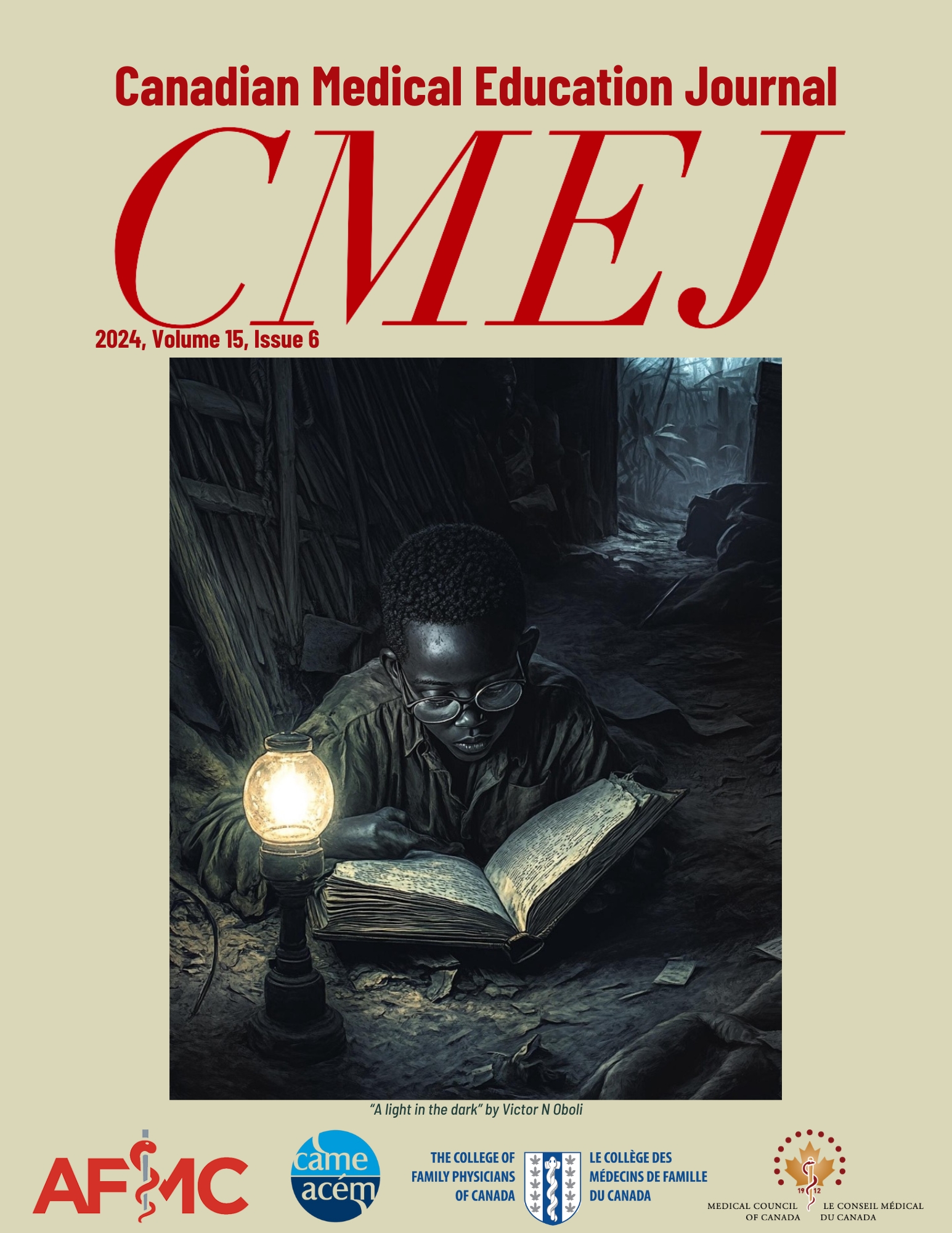La carte d'information en psychiatrie : Une ressource de poche pour faciliter la transition des étudiants vers l'externat de psychiatrie
DOI :
https://doi.org/10.36834/cmej.79374Résumé
Énoncé des implications de la recherche
La carte d'information en psychiatrie (CIP) est une ressource pratique, structurée et concise destinée à renforcer la confiance, les connaissances et l'autoréflexion des étudiants en médecine au cours de leurs stages en psychiatrie. Son utilité réside dans le fait qu'elle apporte un soutien ciblé aux étudiants qui passent de l'apprentissage en classe à la pratique clinique, et qu'elle aborde les défis particuliers qui se posent au cours de cette phase critique de l'éducation médicale. En offrant des données accessibles et pertinentes qui s’harmonisent aux objectifs du stage, la CIP permet d'accroître les connaissances avant et après le stage, et d'améliorer l'expérience d'apprentissage. L'acceptabilité de la CIP est démontrée par le taux de recommandation élevé (90 %) parmi les participants, qui ont approuvé son intégration dans les stages. En outre, le faible coût et la facilité de distribution de la CIP en font une ressource rentable, ce qui confirme la faisabilité de sa mise en œuvre à grande échelle. Par conséquent, nous recommandons son intégration officielle dans le programme d'études.
Références
Whipple ME, Barlow CB, Smith S, Goldstein EA. Early introduction of clinical skills improves medical student comfort at the start of third-year clerkships. Acad Med. 2006; 81 (10 Suppl): S40-43.https://doi.org/10.1097/00001888-200610001-00011 DOI: https://doi.org/10.1097/00001888-200610001-00011
Radcliffe C, Lester H. Perceived stress during undergraduate medical training: A qualitative study. Med Educ. 2003; 37(1): 32–38. https://doi.org/10.1046/j.1365-2923.2003.01405.x DOI: https://doi.org/10.1046/j.1365-2923.2003.01405.x
O’Brien B, Cooke M, Irby DM. Perceptions and attributions of third-year student struggles in clerkships: do students and clerkship directors agree? Acad Med. 2007; 82: 970-978. https://doi.org/10.1097/acm.0b013e31814a4fd5 DOI: https://doi.org/10.1097/ACM.0b013e31814a4fd5
Firth J. Levels and sources of stress in medical students. Br Med J (Clin Res Ed). 1986; 292(6529):1177–1180. https://doi.org/10.1136/bmj.292.6529.1177 DOI: https://doi.org/10.1136/bmj.292.6529.1177
Lajoie SP. Transitions and trajectories for studies of expertise. Educ Res. 200332(8): 21–25. https://doi.org/10.3102/0013189X032008021 DOI: https://doi.org/10.3102/0013189X032008021
Lave J, Wenger E. Situated Learning: Legitimate peripheral participation. Cambridge University Press; 1991. pp.140s. https://doi.org/10.1017/CBO9780511815355 DOI: https://doi.org/10.1017/CBO9780511815355
Téléchargements
Publié
Numéro
Rubrique
Licence
© Hiba Rahman, Aarondeep Shokar, Mariam Alaverdashvili, Dawn De Souza 2023

Cette œuvre est sous licence Creative Commons Attribution - Pas d'Utilisation Commerciale - Pas de Modification 4.0 International.
La soumission d’un manuscrit original à la revue constitue une indication qu’il s’agit d’un travail original, qu’il n’a jamais été publié et qu’il n’est pas envisagé pour publication dans une autre revue. S’il est accepté, il sera publié en ligne et ne pourra l’être ailleurs sous la même forme, à des fins commerciales, dans quelque langue que ce soit, sans l’accord de l’éditeur.
La publication d’une recherche scientifique a pour but la diffusion de connaissances et, sous un régime sans but lucratif, ne profite financièrement ni à l’éditeur ni à l’auteur.
Les auteurs qui publient dans la Revue canadienne d’éducation médicale acceptent de publier leurs articles sous la licence Creative Commons Paternité - Pas d’utilisation commerciale, Pas de modification 4.0 Canada. Cette licence permet à quiconque de télécharger et de partager l’article à des fins non commerciales, à condition d’en attribuer le crédit aux auteurs. Pour plus de détails sur les droits que les auteurs accordent aux utilisateurs de leur travail, veuillez consulter le résumé de la licence et la licence complète.











